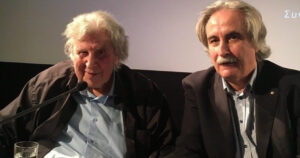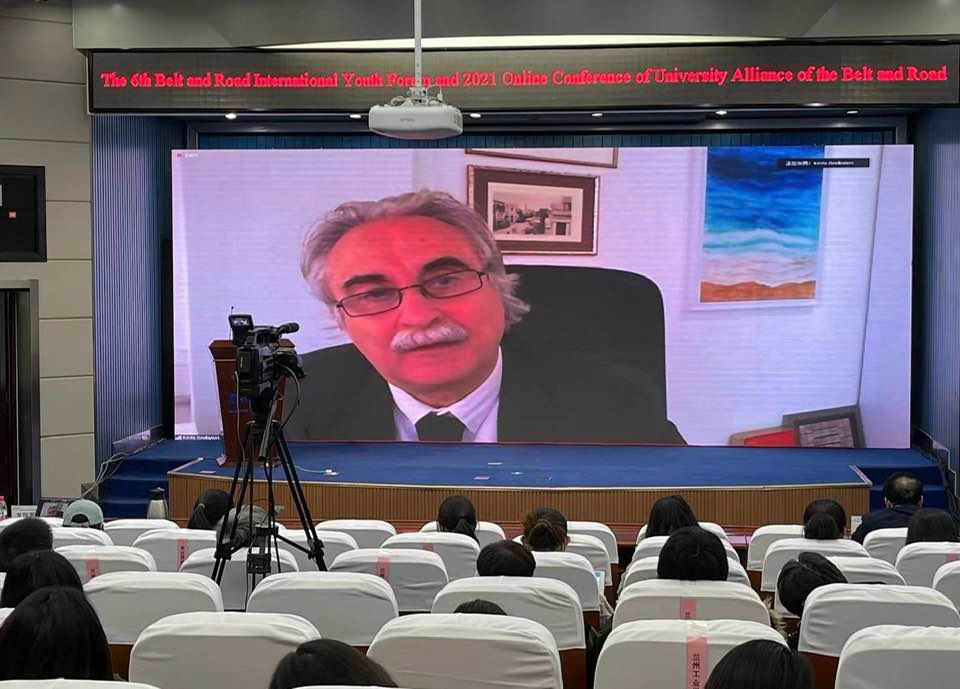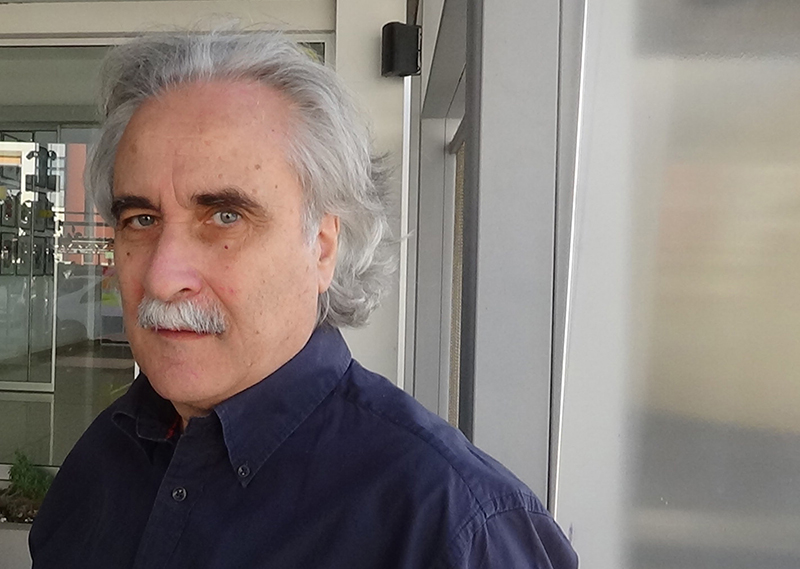In a ‘romantic migrant’ THEO PANAYIDES finds a man of simple pleasures and complex theories who is a great talker but struggles in our fluid times with the impoverishment of language
“All I have is the logos,” declares Kostas Gouliamos – but what is the ‘logos’, exactly? In Greek it means ‘word’ or ‘speech’, but it’s surely a lot more than that. In Christian theology it can often refer to Jesus – but Kostas, a lifelong Marxist, is unlikely to have that in mind. He himself offers ‘discourse’ as a possible translation, and he should know (he’s translated Faulkner into Greek, among other accomplishments, albeit his poems rather than his famously dense novels) – but ‘discourse’ is a very academic word, as you’d expect from a (now retired) academic. He doesn’t even mean ‘logos’ in the verbal, intellectual sense, he clarifies, but emotional too – “And I’ll tell you something else,” he adds: “I believe the longest distance isn’t from here to Auckland, New Zealand. The longest distance we must cross, as human beings, is between the head and the heart.”
All this is in Greek – which is too bad, since something of his verbal flair inevitably gets lost in translation. His English, I assume, is very fluent, after all he lived in Canada for many years, has written extensively in English and was also Rector of European University Cyprus for nearly a decade (2013-21) – but that doesn’t mean he’s equally bilingual. Greek is the language of his heart, the language of his poetry (his most recent collection, Liquid Glass, won the Panhellenic Poetry Prize ‘Jean Moreas’ in 2020), and he wields it flamboyantly; English is a kind of professional asset, the language of thoughtful academic tomes with titles like Happy Slaves: A Duologue on Multicultural Deficit, which he co-wrote with William Anselmi in 2005.
We talk, in short, in Greek (or rather, he talks; I just try to keep up), sitting at GoHealthy, a coffee shop and sandwich place where he’s obviously a regular, often pausing to return people’s greetings as they pass. I assume these friendly acquaintances are from his old university, which is just down the road (he’s still there semi-regularly, as a senior advisor for development) – but many are also journalists from Phileleftheros, which is housed in the same building. Journalists love him, probably because he’s such a great talker (the logos again), though also a distinctive, affable presence, with his cool green eyes, small thick moustache and great mane of silvery hair. How does he see himself? “As a deacon of thought and reflection,” he replies – “and of course as a poet”.

Guliamos with Mikis Theodorakis
There’s a slight contradiction here. Poetry, after all, is the art of succinctness and, as he puts it, “explosiveness”, packing a richness of feeling into a memorable image or turn of phrase; academia runs on structure and methodology, not to mention a notoriously tortuous writing style. Poets can go for years without publishing – Kostas himself put out his first collection of poems in 1976, when he was 21 (he’s now 67), and has only produced five more collections in the years since – whereas academics have to keep publishing just for the sake of publishing, if they want to make their way up the ladder. It’s the “bureaucratisation of science,” he observes sadly – yet he himself was a top bureaucrat for many years, as rector. Is there perhaps a division in his personality? Is he both in and out of the system? “First of all, I’d like to say this,” he declares in his erudite way: “My thinking is not subject to the Cartesian notion of dualism, or even mechanism, which is a trait not just of the Enlightenment but above all of the Industrial Age”.
Head and heart go together, in other words. It’s all one unit – one man – and the various contradictions are part of the whole. Here, for instance, is one contradiction: “I’m a child of the sea, but I love the mountains”. His childhood home in Kalamata, in the southern Peloponnese, was a few hundred metres from the port – yet his favourite spot in Cyprus (where he’s lived since 2000, having come as a “romantic migrant” to marry the woman who’s now his wife) is Troodos, the nearby villages and the peak itself, a subject on which he waxes… well, poetic. “There’s an aura – it makes you feel like part of the universe. Especially when night falls and you look at the sky, and you feel like you could reach up and catch it. That energy Troodos gives, that’s the energy of Cyprus. Cyprus isn’t in the beaches”, he adds sniffily, all those “bodies” showing off in Ayia Napa.
Another contradiction: he’s a purist when it comes to language, and talks disapprovingly of people saying ‘Thank you’ in English in the midst of conversing in Greek (“Where does it come from, this ‘Thank you’?”) – yet he also views himself as a nomad, a citizen of the world. (“My only homeland is language,” he says later, which goes some way to explaining the contradiction.) He loves openness, whether it’s the mountains or the endless kingdom of ideas; he hates feeling stifled, whether it’s national borders (he recalls travelling in Europe as a young man, and feeling resentment rise up whenever he was asked to show his passport) or the rigid rules of academic writing. The ‘logos’, in a way, is his sanctuary, the one domain where he can be punctilious – about what he says, and how he says it – in the midst of fluid times and a vast, undiscriminating universe.

Addressing the Chinese University
Times are fluid, very much so. Each year seems to bring a new gadget, a new invention; we live, he observes, in “a transitory society”, and it leads to the impoverishment of language. “The human brain suffers a kind of blackout,” it can’t deal with the dizzying speed at which everything happens. “And because we can’t think, we can’t feel either. We don’t have language anymore, we can’t talk. People communicate like diplomats when they’re posted in a foreign country – they learn the local language and talk with [a vocabulary of] 300 words, giving the impression that they know it… We’ve reached an extreme point in the eclipse of language, and that eclipse creates a darkness of thought.”
Kostas is old-school, in many ways. At one point he complains about social media, “the invasion of so-called social networks” in today’s society. (He himself is on Facebook and Twitter, but tries to set a higher standard; recent posts have included quoting Dylan Thomas and commenting on ‘quantum entanglement’.) He also seems unimpressed with the new, rights-based culture of taking offence: “For instance if I did this to you,” he notes, tapping me lightly on the shoulder, “you might misunderstand it, and report me”. He’s a man of the old Left – also distinct, in geopolitical terms, from the new Left which is now baying loudly for war against Russia. One of his most intriguing books (written in 2013, with two co-authors) is titled The Marketing of War in the Age of Neo-Militarism – a subject on which he continues to hold strong views even now, when it’s become unfashionable.
We have entered a “dangerous age,” he informs me, “the militarisation of society. Our societies like to think they’re – in fact they call themselves ‘societies of knowledge’, yet they end up being societies of ignorance, and societies of the war industry”. That industry, he observes – the so-called military-industrial complex – is worth $2 trillion globally, with the US at the helm. “They’re always trying to find the useful enemy. And the useful idiots… One thing’s for sure, if this huge sum went towards the environment instead, or towards solving poverty or inequality, we’d have a very different kind of society.”
And yet, I point out – thinking of the war in Ukraine specifically – people seem to accept it willingly. The idea of a ‘good’ war is very prevalent.
“Well of course, the dominant ‘logos’ always looks for ways to obtain consent,” replies Kostas – and, as so often in our conversation, cites a famous reference, in this case Antonio Gramsci who wrote of “how people consume various narratives. Lenin also put it very nicely, he talked about ‘happy slaves’. That’s a difference we have from people in the Middle Ages – because they actually knew they were slaves”. Then again, his politics seem to contain yet another contradiction – because he deeply admires China (a country that many would consider the very definition of ‘happy slaves’), in fact he has something of a “love affair with China”, in fact he’s an honorary professor at various universities in China. Doesn’t he find their political system a bit… well, repressive?
“Not at all,” he replies, that’s just Western propaganda. “If you go, you’ll see that it’s nothing like what you’ve heard.”
But what about their social credit system?
“The what?” he frowns, puzzled. “What do you mean ‘social credit’?”
Well you know, I persist. Like for instance if you have debts your social credit goes down, and you’re prevented from travelling and so on?
“First I’ve heard of that,” says Kostas. “Doesn’t exist. I don’t know it.”
I’m a little nonplussed – but China, after all, is a big place. Actually, this talk of politics raises a related topic: we already have one ex-rector running for president (that would be Constantinos Christofides, of the University of Cyprus). Would he ever consider something similar, given how deeply he feels about changing the world?
Kostas smiles, but shakes his head. He doesn’t want that kind of visibility – and besides, he sighs, Cyprus “is a deeply conservative society, which won’t change easily… Look,” he adds, sliding back into ‘logos’ again, “one of the major issues with our society is that, being a product of a deep but violent reconstruction – with the invasion and occupation – we went through a kind of pseudo-urbanisation. But it’s fake, this urbanisation – we remain a deeply agricultural society. That we have five cafés, five restaurants and 45 luxury cars isn’t enough to transform country people into urbanites.”
But being a country person isn’t always bad.
“Of course not. Not at all. I’m not saying it as a negative – far from it. But when you haven’t accepted what you really are, you begin to suffer from a kind of complex… and you behave in nouveau riche ways”. We don’t have a system of values, he notes – just a kind of “parasitic consumerism”, an often-hypocritical religiosity and “what MacPherson in Canada called possessive individualism… Meaning, ‘that’s mine!’. The ego, as in a small child.”
And what of Kostas Gouliamos himself? What exactly are his own values? Hard to boil down to a couple of sentences, obviously – but it shouldn’t be forgotten that he is, after all, a poet, and actually a much-acclaimed poet. Manos Hadjidakis, one of the great figures of Greek music, based an entire audiovisual production on Kostas’ 1981 collection Neurasthenic Landscapes; Mikis Theodorakis, another great figure, was a close friend, and they actually co-wrote an essay called The Dialectics of Harmony in 2018. Kostas spent years as an academic, even as a bureaucrat – but the ‘logos’, lest we forget is emotional (and poetic) as well as cerebral. He may sound dry and wordy on paper, with his erudite references, but there’s a reason why so many other regulars greet him as they pass. He’s warm; people respond to him. And if he notes that Cypriots are basically peasants – well, he’s something of a peasant himself.
“I’m the kind of guy who loves the land,” he tells me. “I’m earthy, I’m a villager. Like for instance, oil – the olive. Wine – the vine. Figs. Bread – wheat, grain. These are the things I surround myself with, and I really have the sense – or perhaps just the illusion – when I get together with my friends that we’re taking Communion, if you like, with the blood and body of the universe. A universe that has brought us together as nomads, as travellers, on this planet called Earth.”
He likes simple pleasures, even as he spouts complex theories. He loves wine, music, literature; he also loves football, of all things. Does he have any character flaws? “I accept too much,” sighs Kostas after a pause. “I tolerate all this ridiculous situation [in the world]. I should really be more outspoken. I’m not.” Perhaps he should be colder but he’s not, he gets sentimental and thinks ‘After all, we’re only human’. The intro on his Facebook page is the famous Samuel Beckett quote about failure – “No matter. Try Again. Fail again. Fail better” – and maybe that’s the crux of it, a feisty old Lefty fighting a quixotic fight against marketing and militarism, and the Deep State and the transitory society. Triumph, after all, makes for prose, melancholy makes for excellent poetry. And the ‘logos’, what exactly is that? Hard to say, but it’s all we’ve got.







Click here to change your cookie preferences